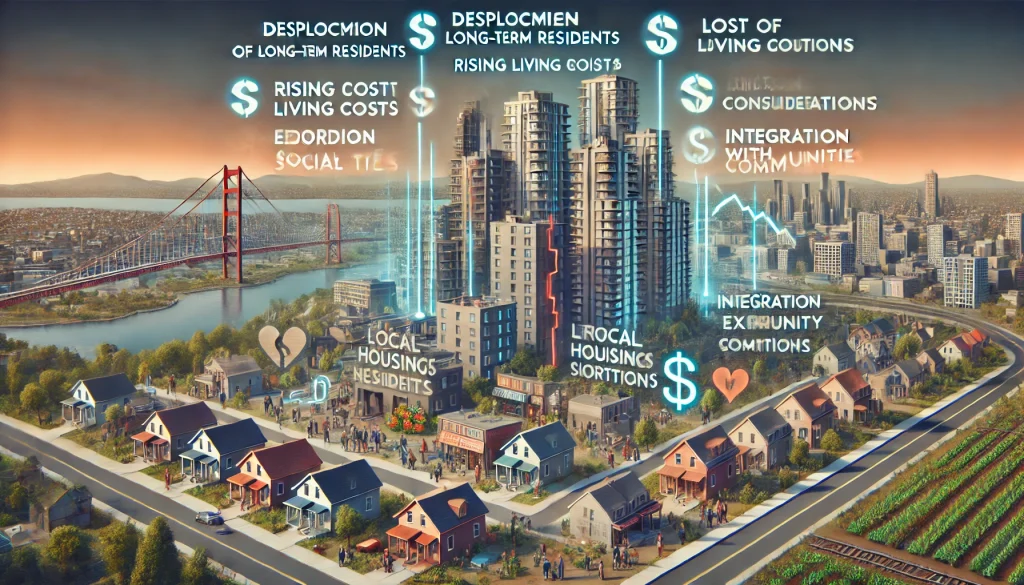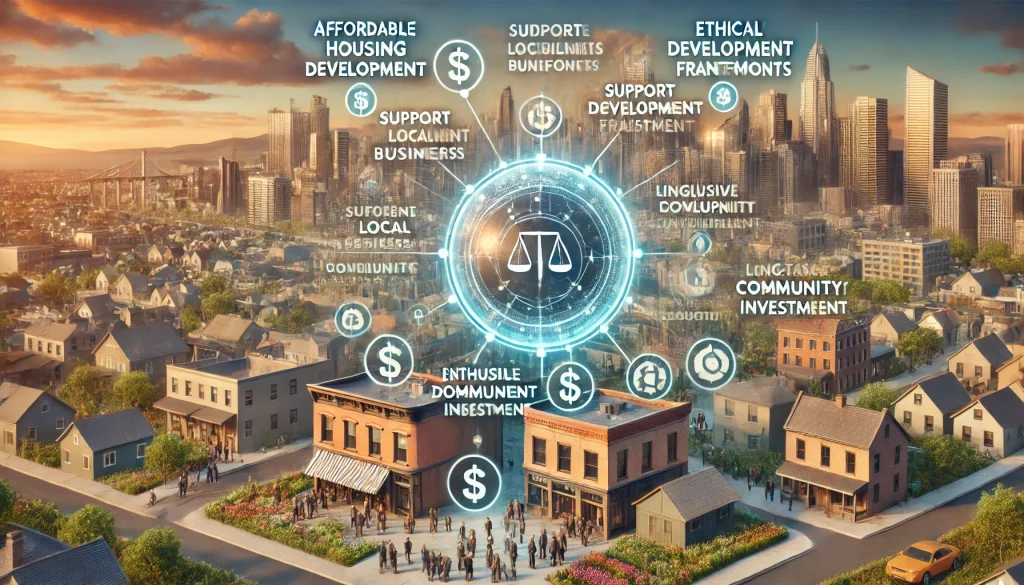Problem Statement
Gentrification is a complex and often controversial process that, while bringing economic revitalization and improved infrastructure to urban neighborhoods, can also lead to the displacement of long-term residents and profound changes in community dynamics. As real estate companies play a crucial role in developing and managing properties in gentrifying areas, they are faced with the significant challenge of balancing profit motives with the ethical and social implications of their projects.
On one hand, gentrification can lead to increased property values, new businesses, and improved public services, which are generally seen as positive developments for an area. However, these benefits often come at the cost of rising rents and living costs, which can force long-term residents, particularly those from lower-income backgrounds, to leave their neighborhoods. This displacement can erode the social fabric of communities, leading to the loss of cultural diversity, local heritage, and social ties that have been built over generations.
For real estate companies, the challenge lies in navigating these ethical concerns while pursuing profitable developments. The pressure to maximize returns on investment can sometimes lead to decisions that prioritize high-end developments and luxury housing at the expense of affordable options. This, in turn, exacerbates the displacement of existing residents and contributes to the growing inequality in urban areas.
Moreover, gentrification can alter the character and culture of neighborhoods, leading to tensions between new and long-standing residents. Real estate developers must consider how their projects impact the social dynamics of the area, ensuring that new developments integrate with and enhance the existing community rather than displacing it.
To address these challenges, real estate companies must adopt strategies that promote inclusive development, ensuring that the benefits of gentrification are shared by all residents, not just newcomers. This includes investing in affordable housing, supporting local businesses, and engaging with community members to understand their needs and concerns. By doing so, real estate companies can contribute to the revitalization of neighborhoods in a way that respects and preserves the unique character and history of the communities they serve.
Pain Points
- Displacement of Long-Term Residents: Rising property values and rents can force long-standing residents to leave their neighborhoods.
- Rising Living Costs: Gentrification often leads to increased living costs, making it difficult for lower-income residents to remain in their communities.
- Loss of Cultural Diversity: The displacement of long-term residents can lead to a loss of cultural diversity and local heritage.
- Community Tensions: Gentrification can create tensions between new and long-standing residents, altering the social dynamics of neighborhoods.
- Balancing Profit with Community Impact: Real estate companies face the challenge of maximizing profits while ensuring that developments benefit all residents.
- Affordable Housing Shortages: The focus on high-end developments can lead to a shortage of affordable housing options.
- Erosion of Social Ties: Displacement and changes in community dynamics can weaken social ties and networks within neighborhoods.
- Ethical Considerations: Real estate companies must navigate the ethical implications of their projects in gentrifying areas.
- Integration with Existing Communities: Ensuring that new developments integrate with and enhance the existing community rather than displacing it.
- Long-Term Community Sustainability: The challenge of creating developments that contribute to the long-term sustainability and resilience of communities.

Future Vision
Our platform envisions a future where real estate companies actively contribute to the creation of inclusive, vibrant, and sustainable communities in gentrifying areas. To achieve this, the platform will support real estate developers in adopting strategies that balance profitability with social responsibility, ensuring that their projects benefit all residents, not just newcomers.
A key focus will be on preventing the displacement of long-term residents. The platform will advocate for the development of affordable housing options that cater to a diverse range of income levels, ensuring that existing residents can remain in their neighborhoods. Real estate companies will be encouraged to invest in mixed-income developments that provide a variety of housing choices, from affordable units to market-rate and luxury options.
Supporting local businesses will also be a priority. The platform will promote strategies that help preserve and strengthen the local economy, ensuring that small businesses and community-serving enterprises can thrive alongside new developments. This includes offering commercial spaces at affordable rates, providing grants or loans to local entrepreneurs, and incorporating community-oriented amenities into new projects.
Community engagement will be central to the platform’s approach. Real estate companies will be guided in conducting meaningful consultations with local residents to understand their needs, concerns, and aspirations. By involving the community in the planning and development process, companies can create projects that are more likely to be welcomed and supported by the neighborhood.
The platform will also focus on preserving the cultural and social fabric of communities. This involves integrating new developments in a way that respects the history, character, and identity of the neighborhood. Real estate companies will be encouraged to incorporate cultural elements into their designs, such as public art, community spaces, and heritage preservation initiatives.
Ethical considerations will be at the forefront of the platform’s recommendations. Real estate companies will be guided in adopting ethical frameworks that prioritize social responsibility, transparency, and accountability. This includes setting clear goals for community impact, regularly assessing the social outcomes of developments, and being transparent about the benefits and potential challenges of gentrification.
By addressing these challenges and adopting inclusive development strategies, real estate companies can play a positive role in the revitalization of gentrifying areas. This approach will not only contribute to the economic growth of neighborhoods but also ensure that all residents, regardless of their income level or background, can share in the benefits of urban development.
Use Cases
- Affordable Housing Development: Investing in mixed-income developments that provide a variety of housing options for different income levels.
- Support for Local Businesses: Offering commercial spaces at affordable rates and providing financial support to local entrepreneurs.
- Community Engagement Initiatives: Conducting meaningful consultations with local residents to understand their needs and involve them in the planning process.
- Cultural Preservation Projects: Integrating cultural elements into new developments, such as public art, community spaces, and heritage preservation initiatives.
- Ethical Frameworks for Development: Adopting ethical frameworks that prioritize social responsibility, transparency, and accountability in real estate projects.
- Inclusive Design Principles: Designing developments that enhance the existing community and promote social integration rather than displacement.
- Long-Term Community Investment: Committing to the long-term sustainability and resilience of neighborhoods through ongoing investment and support.
- Transparency and Accountability: Being transparent about the potential impacts of developments and regularly assessing their social outcomes.
- Partnerships with Community Organizations: Collaborating with local organizations to support community-led initiatives and address the needs of vulnerable residents.
- Economic Revitalization with Inclusivity: Ensuring that economic growth benefits all residents, not just newcomers, by promoting inclusive development practices.
Target Users and Stakeholders
- User: Real Estate Developers, Urban Planners, Community Relations Managers, Corporate Social Responsibility Officers, and Investment Teams
- Age Group: 30-60 years
- Gender: M/F
- Usage Pattern: Regular usage for planning, designing, and managing real estate projects in gentrifying areas with a focus on community impact and inclusivity
- Benefit: Enhanced community relations, improved social outcomes, and sustainable, inclusive developments that balance profitability with social responsibility
- Stakeholders:
- Real Estate Companies: Developers and property managers involved in projects in gentrifying areas.
- Local Communities: Residents who may be affected by gentrification, including long-term residents and newcomers.
- Government and Regulatory Bodies: Agencies responsible for urban planning, housing policy, and community development.
- Community Organizations: Local groups advocating for affordable housing, cultural preservation, and community empowerment.
- Investors: Individuals and institutions investing in real estate projects with a focus on social impact and sustainability.
- Small Businesses: Local entrepreneurs and business owners who may be affected by changes in the neighborhood.
Key Competition
- L+M Development Partners: Known for its commitment to affordable housing and community engagement in urban development projects.
- Related Companies: Invests in mixed-income developments and works to integrate new projects into the existing community fabric.
- Jonathan Rose Companies: Focuses on sustainable and socially responsible real estate developments, including affordable housing and community-oriented projects.
- Forest City Realty Trust: Engages in urban development projects that prioritize community impact and cultural preservation.
- Silverstein Properties: Works on large-scale urban developments with a focus on balancing economic growth with social responsibility.
Products/Services
- L+M Affordable Housing Initiatives: Developing mixed-income housing projects that cater to a diverse range of residents.
- Related Companies Community Integration: Designing developments that enhance the existing community and promote social inclusion.
- Jonathan Rose Companies Sustainability Projects: Investing in environmentally sustainable and socially responsible real estate developments.
- Forest City Cultural Preservation: Incorporating cultural and heritage elements into urban development projects.
- Silverstein Properties Community Engagement: Conducting meaningful consultations with local residents to involve them in the planning process.
Active Startups
- InclusiveDev: Focuses on developing affordable and inclusive housing projects that prevent the displacement of long-term residents.
- CommunityRoots: Specializes in cultural preservation and community engagement in urban development projects.
- EquitableSpace: Offers affordable commercial spaces for local businesses in gentrifying neighborhoods to support economic diversity.
- EthicalUrban: Provides consulting services for real estate companies looking to adopt ethical frameworks for development.
- NeighborImpact: Develops technology solutions for real estate companies to assess and report on the social impact of their projects
- GreenCity: Focuses on environmentally sustainable and community-oriented urban development projects.
- RootedInPlace: Specializes in heritage preservation and the integration of cultural elements into new developments.
- CivicBuild: Works with local governments and community organizations to promote inclusive and equitable urban development.
- ImpactInvest: Provides investment opportunities in real estate projects with a focus on social impact and community benefit.
- UrbanEquity: Innovates in the design and development of mixed-income housing projects that promote social integration.
Ongoing Work in Related Areas
- Affordable Housing Research: Exploring new models for developing and financing affordable housing in gentrifying areas.
- Cultural Preservation Strategies: Researching best practices for preserving cultural heritage and community identity in urban development.
- Community Engagement Innovations: Developing new methods for involving local residents in the planning and decision-making processes of real estate projects.
- Ethical Development Frameworks: Creating guidelines and standards for ethical real estate development that prioritize social responsibility.
- Mixed-Income Housing Models: Innovating in the design and development of mixed-income housing that fosters social integration and prevents displacement.
- Sustainability and Resilience: Researching strategies for creating environmentally sustainable and resilient communities in urban areas.
- Economic Revitalization with Inclusivity: Exploring approaches to economic revitalization that ensure benefits are shared by all residents.
- Community-Oriented Urban Design: Innovating in the design of urban spaces that prioritize community well-being and social inclusion.
- Social Impact Reporting: Developing tools and methodologies for assessing and reporting on the social impact of real estate projects.
- Public-Private Partnerships: Exploring new models for collaboration between real estate companies, governments, and community organizations to promote inclusive development.
Recent Investment
- InclusiveDev: $30M in Series A funding led by impact investment firms focused on affordable housing, January 2021.
- CommunityRoots: $25M in Seed funding from cultural preservation and community development investors, March 2020.
- EquitableSpace: $20M in Series B funding from real estate investors focused on social impact, June 2021.
- EthicalUrban: $15M in Series A funding from ethical investment firms, September 2020.
- NeighborImpact: $12M in Seed funding from technology investors focused on social impact assessment, December 2020.
Market Maturity
The market for inclusive and ethical real estate development is maturing rapidly as companies and investors recognize the importance of balancing profit with social responsibility. Companies like L+M Development Partners, Related Companies, and Jonathan Rose Companies are leading the way with investments in affordable housing, community engagement, and sustainable development. Startups such as InclusiveDev, CommunityRoots, and EquitableSpace are driving innovation in affordable housing, cultural preservation, and ethical development frameworks. Significant investments in affordable housing research, cultural preservation strategies, and community engagement innovations are transforming the real estate industry, enabling developers to create projects that benefit all residents and contribute to the long-term sustainability of neighborhoods. As the market continues to evolve, we expect to see more integrated and advanced solutions that promote inclusive development and position real estate companies as leaders in ethical and socially responsible development.
Summary
Gentrification, while often leading to economic revitalization, can also result in the displacement of long-term residents and changes to community dynamics. Real estate companies involved in developing or managing properties in gentrifying areas must navigate the ethical and social implications of their projects. Balancing profit with community impact and ensuring that developments benefit all residents, not just newcomers, is a significant challenge. Our proposed platform leverages affordable housing development, support for local businesses, community engagement initiatives, cultural preservation projects, ethical frameworks for development, inclusive design principles, long-term community investment, transparency and accountability, partnerships with community organizations, and economic revitalization with inclusivity to address these challenges. Key pain points include displacement of long-term residents, rising living costs, loss of cultural diversity, community tensions, balancing profit with community impact, affordable housing shortages, erosion of social ties, ethical considerations, integration with existing communities, and long-term community sustainability.
Target users include real estate developers, urban planners, community relations managers, corporate social responsibility officers, and investment teams, with stakeholders encompassing real estate companies, local communities, government and regulatory bodies, community organizations, investors, and small businesses. Key competitors like L+M Development Partners, Related Companies, Jonathan Rose Companies, Forest City Realty Trust, and Silverstein Properties offer various affordable housing initiatives, community integration projects, and ethical development frameworks, while startups such as InclusiveDev, CommunityRoots, and EquitableSpace are driving innovation in affordable and inclusive housing, cultural preservation, and ethical urban development. Recent investments highlight significant interest and growth potential in platforms addressing the challenges of gentrification and promoting inclusive and ethical development in the real estate industry.
By addressing these challenges and adopting inclusive development strategies, real estate companies can play a positive role in the revitalization of gentrifying areas. This approach will not only contribute to the economic growth of neighborhoods but also ensure that all residents, regardless of their income level or background, can share in the benefits of urban development.



